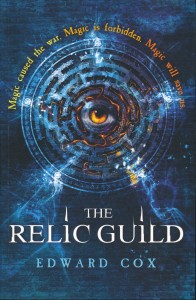
 “Writers are always looking to challenge themselves, to try something they haven’t done before, to improve, to learn. I chose a complicated method of telling a story, but it felt fresh and new to me, and, most importantly, it felt right for The Relic Guild. Whatever frustrations I experienced during the writing, the biggest challenge was making it read in a simple and uncomplicated way. So far, on this strange journey as a debut novelist, my biggest source of joy has come from the readers of The Relic Guild who understand exactly what it is I’ve tried to give them: a piece of entertainment full of magic, monsters and mayhem.”
“Writers are always looking to challenge themselves, to try something they haven’t done before, to improve, to learn. I chose a complicated method of telling a story, but it felt fresh and new to me, and, most importantly, it felt right for The Relic Guild. Whatever frustrations I experienced during the writing, the biggest challenge was making it read in a simple and uncomplicated way. So far, on this strange journey as a debut novelist, my biggest source of joy has come from the readers of The Relic Guild who understand exactly what it is I’ve tried to give them: a piece of entertainment full of magic, monsters and mayhem.”
edwardcox.net
@EdwardCox10
The Relic Guild
It was said the Labyrinth had once been the great meeting place, a sprawling city at the heart of an endless maze where a million humans hosted the Houses of the Aelfir. The Aelfir who had brought trade and riches, and a future full of promise. But when the Thaumaturgists, overlords of human and Aelfir alike, went to war, everything was ruined and the Labyrinth became an abandoned forbidden zone, where humans were trapped behind boundary walls 100 feet high.
Now the Aelfir are a distant memory and the Thaumaturgists have faded into myth. Young Clara struggles to survive in a dangerous and dysfunctional city, where eyes are keen, nights are long, and the use of magic is punishable by death. She hides in the shadows, fearful that someone will discover she is touched by magic. She knows her days are numbered. But when a strange man named Fabian Moor returns to the Labyrinth, Clara learns that magic serves a higher purpose and that some myths are much more deadly in the flesh.
The only people Clara can trust are the Relic Guild, a secret band of magickers sworn to protect the Labyrinth. But the Relic Guild are now too few. To truly defeat their old nemesis Moor, mightier help will be required. To save the Labyrinth – and the lives of one million humans – Clara and the Relic Guild must find a way to contact the worlds beyond their walls.
… and to give you a few insights into this year’s nominated authors, we’ve asked them all a few questions…
Tell us one of your early favourite fantasy novels?
The Memory, Thorn & Sorrow series by Tad Williams, for its depth and detail, and for teaching me so much about world building.
What fantasy novel was a real game changer, shifting the way you thought about epic fiction?
The Knights of Dark Renown by David Gemmell. It was the first time I experienced a fantasy where evil was complicated, death was ugly, and heroes didn’t have to be good.
What do you like to see on fantasy novel cover art? What puts you off?
Something provocative and mysterious; something that demands a story be told about it. What puts me off is when I’m shown obvious, unimaginative images. For me, good cover art is like a good movie trailer: enticing.
What classic fantasy themes always get your interest on the cover or in the write up of a new book? Any pet hates?
The few against the many. Show me a group facing impossible odds, and I’ll dive headfirst into that story every time. A pet hate would be when those odds are far too easy to overcome. I like the uncertainty of a group’s fate to take me right to the end of a story.
What’s the next big thing you’d like to see in epic fantasy fiction?
After recent a conversation with two fellow authors, an Ewoks Vs Aliens mashup has to be on the cards. I honestly don’t see how genre fiction can survive without the answer to who would win.
Edward Cox began writing stories at school as a way to pass time in boring lessons. With his first short story published in 2000, Edward spent much of the next decade earning a BA 1st class with honours in creative writing, and a Master degree in the same subject. He then went on to teach creative writing at the University of Bedfordshire.
Currently living in Essex with his wife and daughter, Edward is mostly surrounded by fine greenery and spiders the size of his hand. The Relic Guild is his first completed novel, and it is the result of more than ten years of obsessive writing.
